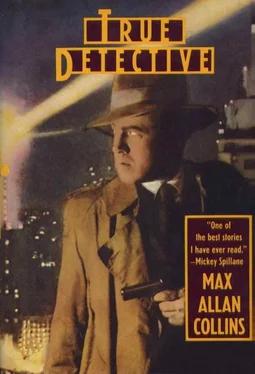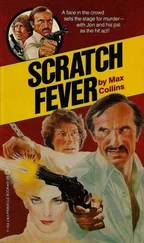“His father said you and Jimmy were pretty friendly. You let him tag along to trials now and then.”
“Yeah. Since he was maybe thirteen. He read the true detective magazines, and Black Mask, and that sort of thing. Kept scrapbooks about Capone and that crowd and so on. It seemed harmless to me. Till he got out of high school, anyway, and started feelin’ his oats.”
“Drinking, carousing, you mean? Lots of kids do that, when they hit eighteen or so.”
“Sure. A kid out of high school wants to get laid, wants to go out with his pals and get blotto. Flamin’ youth. And so what? No, I wish that was the way Jimmy’d gone: hip flasks and raccoon coats. Oh yass.”
“You mean instead of hanging around speakeasies.”
He had a smile like a fold in cloth. “Yeah. But it’s more than even that. He got thick with the local bootleggers themselves. It’s possible — just possible — he did some work for ‘em. But don’t tell his old man; it’d kill his old man.”
“Don’t worry. Did the kid actually want to be a gangster?”
“Did Jimmy want to be Al Capone when he grew up? Naw. That wasn’t it. It was a combination of a couple of things. First, he was just taken with that crowd, road-show Capones that they were. It was the Nick Coin bunch, and Talarico’s crowd, that he was hanging around with.”
“Those names don’t mean anything to me.”
“Well, Coin and Mike Talarico were sometimes rivals, sometimes partners. You know how that business goes. Coin was shot down in front of his house last summer. Shotgun. Never found the killers, though they held a guy from Muscatine for it, then released him. Somebody brought in from Chicago did it, was the rumor, of course. Probably hired by Talarico, ‘cause Coin had reportedly squealed to the feds. Anyway, Jimmy knew Coin and his crowd. And... well.”
“Go on.”
“Look. John Beame’s a good man; if he’s trying to find his son, I’d like to help. But there’s something that I can only tell you if you swear to secrecy. Absolute goddamn secrecy.”
“All right.”
“You gotta understand Jimmy’s second reason for hanging around with those lowlifes: he wanted to be a writer, a reporter. He wanted to go to Chicago and write about gangsters for the Trib. He didn’t want to get in the game, see; he wanted to sit on the fifty-yard line and do the play-by-play, if you get me.”
“I get you.”
“And this is the part you got to keep to yourself, Jesus, keep it to yourself.” He lowered his voice, leaned toward me. “Jimmy was feeding me stuff. He was hanging around with the Coin crowd, and even doing some minor things for ‘em — driving a truck, here and there, no guns or anything, just bootlegging. But he’d keep his ears open, and he’d tell me things. Pass along the scuttlebutt, get it? If something big was up — and we’ve had our share of Chicago-style shootings and bombings and kidnappings and what-have-you — Jimmy’d pass along what he heard. To me.”
“Did you encourage this?”
He looked at me hard, the gray eyes looking like smoky glass; his cigar was out, but he didn’t seem to have noticed.
“I paid him,” he said.
“I see.”
“No you don’t. You gotta understand the kid was doin’ this on his own. And I told him he’d get his damn head blown off if he kept it up, but damnit if he didn’t start feeding me some good tips. I couldn’t help myself; I’m a reporter. And he was eighteen, nineteen, twenty years old when this was goin’ on. He was old enough to be held responsible for his own actions.”
“You wouldn’t happen to know some of the places he hung out, would you? And who his ‘friends’ were?”
“Are you nuts? I never went with him: he couldn’t be seen around with me, if he was gonna do this half-assed undercover work. But I can tell you where some of the speaks in town are, if you like.”
He started rattling ‘em off, and I stopped him till I could get my notepad out. When he’d finished, he said, “I can’t really give you any names of the wharf rats he was hanging around with, ’cause he never really said. He wasn’t close to the big boys, so talking to Talarico or Lucchesi wouldn’t do any good. They probably wouldn’t know Jimmy from Adam. Coin knew Jimmy, but Coin’s dead.”
“Anything else you can tell me?”
“Well. I do know he made some trips to Chicago. This was while he was in college, but during the summers. As early as the summer of ’30. That always bothered me. See, his friend Coin was tight with the Chicago boys. Ever hear of a guy named Ted Newberry?”
The body was in a ditch near a telephone pole.
“Yeah,” I said. “I heard of him.”
“He was the Chicago big shot the Tri-Cities liquor ring was tight with. I covered a trial in the fall of ’31, where Newberry and Coin, Talarico and Lucchesi were codefendants. Anyway, Jimmy went to Chicago a couple times, and I always wondered if he was running an errand or something for Coin. I grilled him about it, but he always claimed it was just pleasure trips. Still, I always had the queasy feeling that Jimmy was getting in over his head. All I could think of were those scrapbooks he put together in junior high and high school, full of Chicago and Capone, and couldn’t help but wonder about those ‘pleasure trips.’”
“Did you talk to him about his plans to go to Chicago and try to get a job there?”
“Yeah. I told him his expectations were unrealistic. That they’d toss him out on his butt. But he had to try, he said. And I guess every kid does have to try. So I didn’t try to stop him. I even wrote him a letter of recommendation, in case he did get in for a real interview by some miracle. And I told him if he flopped, he could come back and I’d try to get him on the Democrat here, as a copyboy if nothing else. And he said — what was it he said? He seemed confident they’d give him a shot. Almost cocky, the little snotnose. ‘Oh, they’ll print my stuff,’ he said. Something like that. Ever heard anything so ridiculous?”
I hadn’t, and I said as much to Mary Ann, in the Palmer cafeteria over lunch. The cafeteria was in a narrow one-story building with a half-roof slanting up against the side of one of the main school buildings; above the archway going in was a motto: “Is Life Worth Living? That Depends On the Liver!”
Well, I wasn’t having liver, though it had been one of the selections; I was having a go at the meat loaf, and it wasn’t a Little Bite O’ Heaven.
“I knew Jimmy had some rough friends,” Mary Ann said, “and knew he went out drinking and all. But I didn’t know about any... gangsters or bootleggers or anything.”
“Maybe you weren’t as close to him as you thought.”
Her eyes stung me. “We were very close.” Then, offhandedly, she said, “I knew he had an interest in criminology.”
“He had an interest in criminals.”
“It’s the same thing.”
“No it isn’t. Ever hear of a guy named Reinhardt Schwimmer?”
She was having liver. She swallowed a bite of it and then said, “Why of course. Rudolph Schwimmer’s name is on the tip of every tongue,” and stuck hers out at me, just a bit. Some college boys who were watching her from a nearby table about fell over when she did that; they’d fallen deeply in love with her back in the cafeteria line.
“Reinhardt Schwimmer,” I said. “He was an optometrist. He had a fascination for gangsters. And since his practice was in Chicago, he had access to some. He took to hanging around with them, at the speakeasies they frequented, even at some of their places of business, including a garage where trucks of hooch got loaded and unloaded. One day Doc Schwimmer dropped by the garage to talk to the boys, who were waiting for their boss Bugs Moran and his second-in-command, a fella named Newberry, to show, when some cops came barging in and told everybody to put their hands in the air.”
Читать дальше












